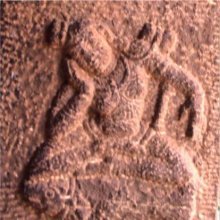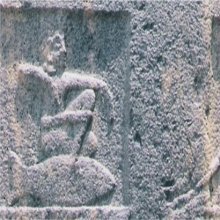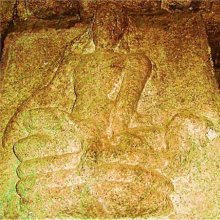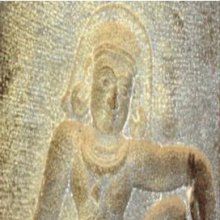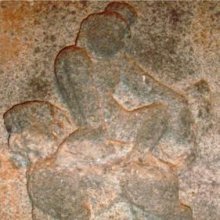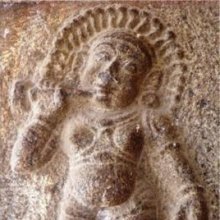Alola, Āloḷa, Ālola: 12 definitions
Introduction:
Alola means something in Hinduism, Sanskrit, Buddhism, Pali, Jainism, Prakrit. If you want to know the exact meaning, history, etymology or English translation of this term then check out the descriptions on this page. Add your comment or reference to a book if you want to contribute to this summary article.
The Sanskrit term Āloḷa can be transliterated into English as Alola or Alolia, using the IAST transliteration scheme (?).
Images (photo gallery)
Languages of India and abroad
Pali-English dictionary
Source: BuddhaSasana: Concise Pali-English Dictionaryalola : (adj.) not covetous or distracted by desires. || āloḷa (m.), agitation; confusion; uproar.
Source: Sutta: The Pali Text Society's Pali-English DictionaryAlola, (adj.) (a + lola) undisturbed, not distracted (by desires), not wavering: of firm resolution, concentrated Sn.65 (= nillolupa Nd2 98; = rasavisesesu anākula SnA 118). (Page 79)
— or —
Āloḷa, (fr. ā + luḷ, cp. āluḷati & āloḷeti) confusion, uproar, agitation DhA.I, 38. (Page 110)

Pali is the language of the Tipiṭaka, which is the sacred canon of Theravāda Buddhism and contains much of the Buddha’s speech. Closeley related to Sanskrit, both languages are used interchangeably between religions.
Sanskrit dictionary
Source: DDSA: The practical Sanskrit-English dictionaryAlola (अलोल).—a.
1) Tranquil, unagitated.
2) Firm, steady.
3) Not fickle.
4) Not thirsty, free from desire.
5) Name of a metre of 14 syllables.
--- OR ---
Ālola (आलोल).—a.
1) Slightly trembling, rolling (as eyes); आलोलायतलोचनाः (ālolāyatalocanāḥ) Bhartṛhari 3.48.
2) Shaken, agitated; आलो- लामलकावलीम् (ālo- lāmalakāvalīm) Amaruśataka 3; क्रीडालोलाः (krīḍālolāḥ) Meghadūta 63.
-laḥ Trembling, agitation.
Source: Cologne Digital Sanskrit Dictionaries: Shabda-Sagara Sanskrit-English DictionaryAlola (अलोल).—mfn.
(-laḥ-lā-laṃ) Firm, steady, tranquil, unagitated. E. a neg. lola moving.
--- OR ---
Ālola (आलोल).—mfn.
(-laḥ-lā-laṃ) Shaken, agitated. m.
(-laḥ) Trembling, agitation. E. āṅ before luḍa to shake, affix ghañ, ḍa changed to la.
Source: Cologne Digital Sanskrit Dictionaries: Benfey Sanskrit-English DictionaryĀlola (आलोल).—adj. trembling a little, [Bhartṛhari, (ed. Bohlen.)] 3, 48; [Kirātārjunīya] 5, 41.
Ālola is a Sanskrit compound consisting of the terms ā and lola (लोल).
Source: Cologne Digital Sanskrit Dictionaries: Monier-Williams Sanskrit-English Dictionary1) Alola (अलोल):—[=a-lola] mfn. unagitated, firm, steady
2) Alolā (अलोला):—[=a-lolā] [from a-lola] f. (also lolā q.v.), Name of a metre (containing four lines, each of fourteen syllables).
3) Ālola (आलोल):—[=ā-lola] [from ā-lulita] a mfn. moving gently
4) [v.s. ...] trembling slightly
5) [v.s. ...] rolling (as an eye), [Amaru-śataka; Meghadūta; Śiśupāla-vadha; Kathāsaritsāgara; Kirātārjunīya]
6) [v.s. ...] m. trembling, agitation
7) [v.s. ...] swinging, rocking.
8) [=ā-lola] b See above.
Source: Cologne Digital Sanskrit Dictionaries: Yates Sanskrit-English Dictionary1) Alola (अलोल):—[a-lola] (laḥ-lā-laṃ) a. Steady.
2) Ālola (आलोल):—[ā-lola] (laṃ) m. Shaking. a. Shaken.
Source: DDSA: Paia-sadda-mahannavo; a comprehensive Prakrit Hindi dictionary (S)Alola (अलोल) in the Sanskrit language is related to the Prakrit word: Alola.
[Sanskrit to German]
Sanskrit, also spelled संस्कृतम् (saṃskṛtam), is an ancient language of India commonly seen as the grandmother of the Indo-European language family (even English!). Closely allied with Prakrit and Pali, Sanskrit is more exhaustive in both grammar and terms and has the most extensive collection of literature in the world, greatly surpassing its sister-languages Greek and Latin.
Prakrit-English dictionary
Source: DDSA: Paia-sadda-mahannavo; a comprehensive Prakrit Hindi dictionaryAlola (अलोल) in the Prakrit language is related to the Sanskrit word: Alola.
Prakrit is an ancient language closely associated with both Pali and Sanskrit. Jain literature is often composed in this language or sub-dialects, such as the Agamas and their commentaries which are written in Ardhamagadhi and Maharashtri Prakrit. The earliest extant texts can be dated to as early as the 4th century BCE although core portions might be older.
Kannada-English dictionary
Source: Alar: Kannada-English corpusĀlōla (ಆಲೋಲ):—
1) [adjective] moving to and fro; trembling; not fixed; swinging back and forth.
2) [adjective] rolling; rotating; revolving.
3) [adjective] agitated; stirred; perturbed.
--- OR ---
Ālōla (ಆಲೋಲ):—
1) [noun] a man interested or engrossed in.
2) [noun] a favourable mental bias; interest.
--- OR ---
Āḷōḷa (ಆಳೋಳ):—
1) [adjective] moving to and fro; trembling; not fixed; swinging back and forth.
2) [adjective] rolling; rotating; revolving.
3) [adjective] agitated; stirred; perturbed.
--- OR ---
Āḷōḷa (ಆಳೋಳ):—
1) [noun] a man interested or engrossed in.
2) [noun] a favourable mental bias; interest.
Kannada is a Dravidian language (as opposed to the Indo-European language family) mainly spoken in the southwestern region of India.
See also (Relevant definitions)
Starts with: Alolacaturthi, Alolaki, Alolam, Alolatva.
Ends with (+3): Arthalola, Baalola, Cimtalola, Dhanalola, Dolalola, Dolikalola, Gadalola, Galola, Ganalola, Halakalola, Hrillakalola, Kalola, Kamalola, Kunkumalola, Lolalola, Madalola, Mahalola, Padalola, Palola, Phalola.
Full-text: Alolatva, Vyalolakuntalakalapavat, Vyalola, Alopam, Alolupa, Alolupyamana, Lola, Aloluptva, Alolupatva, Alolam.
Relevant text
Search found 4 books and stories containing Alola, A-lola, Ā-lola, A-lolā, Āloḷa, Ālola, Alolā, Alōla, Ālōla, Āḷōḷa, Aḷōḷa; (plurals include: Alolas, lolas, lolās, Āloḷas, Ālolas, Alolās, Alōlas, Ālōlas, Āḷōḷas, Aḷōḷas). You can also click to the full overview containing English textual excerpts. Below are direct links for the most relevant articles:
Garga Samhita (English) (by Danavir Goswami)
Verse 2.20.11 < [Chapter 20 - The Rāsa-dance Pastime]
Bhakti-rasamrta-sindhu (by Śrīla Rūpa Gosvāmī)
Verse 1.2.104 < [Part 2 - Devotional Service in Practice (sādhana-bhakti)]
Śrī Kṛṣṇa-karṇāmṛtam (by Śrīla Bilvamaṅgala Ṭhākura)
The Linga Purana (by J. L. Shastri)
Chapter 65 - Thousand names of Śiva (Rudra-sahasranāma) < [Section 1 - Uttarabhāga]
